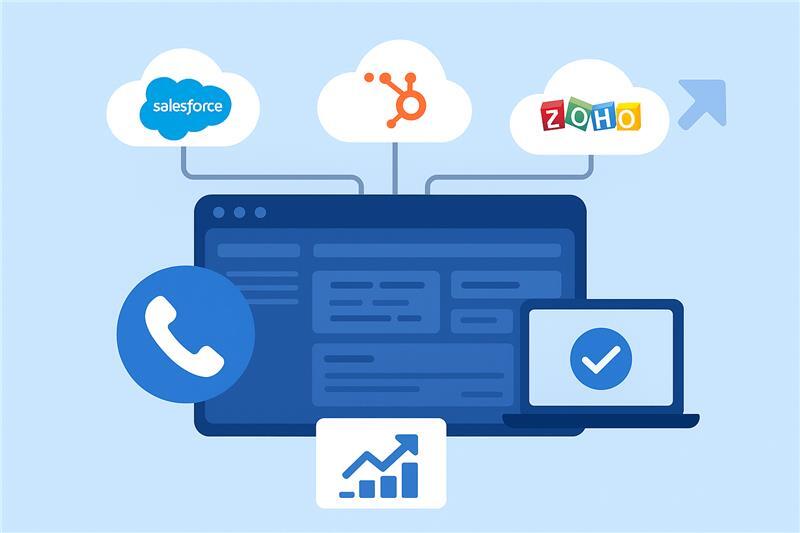
Power of AI-Driven Revenue Intelligence: Essential Insights and Tools for Sales Leaders in 2024
What is Revenue Intelligence?
Revenue intelligence has recently emerged as a new category of technology. The reason why this new tech concept has gained so much popularity in the last couple of years is because of the emergence of AI. Simply speaking, back in the day we did not have the technology to make revenue intelligence work. Now we do.
Thanks to AI, revenue intelligence software can crunch through vast amounts of data points, using different predictive models to unearth hidden trends and connections. It's not just about spotting what's obvious; it can also forecast performance in ways that human analysts could only dream of.
Revenue Intelligence is an AI-driven process that analyzes sales and product data. Its aim is to offer actionable insights into your sales organization, processes, buyers, and customers—empowering you to boost revenue growth.
What Problems is Revenue Intelligence Solving?
Hustle and handwork has never really been an issue with sales teams. What has been a struggle is putting all the effort in the right direction. Revenue Intelligence, helps sales leaders point their team in the right direction, increasing efficiency and productivity which is why it is growing in popularity. These stats prove how crucial a tool it is becoming for sales teams.
- In 2019, the global sales intelligence market was valued at $2.29 billion
- The global revenues intelligence market is expected to grow at an estimated 12.1% compounded annual growth rate (CAGR) between 2024 and 2033
- Venture capital funding for revenue operations and intelligence jumped from $321 million to $952 between 2020 and 2021
As customer demands become more complex, sales leaders are turning to revenue intelligence software to tackle common challenges head-on. It is revolutionizing sales strategy and planning by:
1. Providing Predictable Pipelines
Revenue intelligence offers data-driven sales forecasting, providing actionable insights into future growth opportunities.
2. Enabling Data-Driven Decision Making
By offering insights and predictive analytics, revenue intelligence supports strategic and tactical decision-making, reducing reliance on instinct-driven choices.
3. Optimizing Product Performance
Identifying underperforming products is crucial for optimizing resource allocation and product strategy. Revenue intelligence reveals which products contribute most to the bottom line, guiding strategic decisions.
4. Fueling Growth in Challenging Times
Even in challenging economic climates, revenue intelligence helps organizations focus resources on areas with the highest growth potential. By uncovering root causes of growth issues, revenue intelligence ensures maximum impact.
5. Uncovering Missed Opportunities
Revenue intelligence integrates data from various sources to reveal both explicit and implicit customer behaviors. By understanding prospect timing, buying journey stages, and product interests, sales teams can make informed decisions that maximize sales opportunities.
6. Closing Blind Spots
Manual data entry often leads to incomplete market insights. Revenue intelligence automates data collection, providing a reliable, comprehensive source of truth. This enhances decision-making quality and ensures no critical data is overlooked.
7. Spotting Invisible Signals
Traditional sales analytics may miss implicit buying signals. Revenue intelligence, powered by AI, captures these signals, allowing sales reps to personalize communications and prioritize leads effectively.
How To Find a Revenue Intelligence Platform That Will Work for You?
Now that you're well-versed in the pivotal role revenue intelligence plays in solving critical sales issues, it's time to dive into the quest for the perfect revenue intelligence software. However, here's a crucial point to remember: while technology acts as a catalyst, it's the people and processes within your organization that ultimately drive success. Simply investing in a revenue intelligence tool won't magically fix your sales woes; it requires a dedicated team committed to data-driven decision-making and robust processes for data collection and implementation of insights.
Once you've laid this groundwork, you can embark on evaluating potential software options using the following criteria:
1. Data Collection Capabilities
Look for software that automatically gathers data from a diverse array of sources. Can it seamlessly integrate traditional sales data with third-party sources, marketing channels, and service and support data?
2. Data Cleaning and Consolidation
Ensure the platform offers robust data cleaning and consolidation features. This includes tasks such as removing duplicates and ensuring data accuracy for reliable analysis.
3. Advanced Analytical Tools
Seek out platforms that leverage cutting-edge technologies like AI, machine learning, and predictive analytics to analyze your data. These tools can uncover hidden insights and trends that traditional methods might overlook.
4. Segmentation Functionality
Does the software offer segmentation capabilities for detailed, granular analysis? The ability to segment data allows for a deeper understanding of customer behavior and preferences.
5. Actionable Insights
Ultimately, the goal of revenue intelligence is to provide actionable insights for leaders. Look for platforms that offer intuitive visualizations, charts, graphs, and real-time alerts to help guide decision-making and drive results.
By carefully considering these factors and selecting a revenue intelligence software that aligns with your organization's needs and goals, you can set yourself up for success in navigating the complex world of modern sales. Remember, it's not just about the technology – it's about how you leverage it to transform your sales processes and drive revenue growth.
If your platform meets the criteria listed above, then the odds are you’ve got a high-quality revenue intelligence platform.
Best tools for AI-driven revenue intelligence in 2024
As technology continues to advance, several cutting-edge tools have emerged to empower sales leaders with AI-driven revenue intelligence:
1. Salesken
Salesken is a comprehensive AI-powered sales assistant that empowers sales teams with actionable insights and intelligent recommendations. By leveraging natural language processing (NLP) and machine learning algorithms, Salesken analyzes sales conversations, identifies key trends, and provides real-time coaching to enhance sales performance. With features such as conversation analytics, sentiment analysis, and personalized coaching, Salesken helps sales leaders optimize their sales processes, improve customer interactions, and drive revenue growth.
2. HubSpot Sales Hub
HubSpot Sales Hub integrates AI-driven features, such as predictive lead scoring and email automation, to help sales leaders prioritize leads and close deals more efficiently.
3. Microsoft Dynamics 365 Sales
Microsoft Dynamics 365 Sales leverages AI-driven insights to provide sales leaders with actionable intelligence, enabling them to build stronger customer relationships and drive revenue growth.
4. InsightSquared
InsightSquared offers AI-powered analytics and reporting solutions designed to help sales leaders track performance, identify trends, and optimize sales processes for maximum effectiveness.
5. Salesforce Einstein
Salesforce Einstein leverages AI to deliver predictive analytics, personalized recommendations, and automated workflows, empowering sales teams to sell smarter and faster.
Benefits of Using a Good Revenue Intelligence Tool
A revenue intelligence tool offers numerous benefits to sales leaders, empowering them to enhance their strategies, optimize performance, and drive success. Here are some key advantages:
1. Data-Driven Decision-Making
Revenue intelligence tools provide sales leaders with access to comprehensive, real-time data insights encompassing various aspects of the sales process, including customer interactions, deal progress, and market trends. By leveraging this data, sales leaders can make informed decisions backed by concrete evidence rather than relying on gut instincts or guesswork. This leads to more effective sales strategies and improved outcomes.
2. Enhanced Sales Performance
With access to detailed analytics and performance metrics, sales leaders can gain deeper insights into their team's performance, identify areas for improvement, and implement targeted coaching and training programs. By understanding individual strengths and weaknesses, sales leaders can provide personalized support and guidance to help their team members maximize their potential and achieve their sales targets.
3. Improved Sales Forecasting
Accurate sales forecasting is essential for effective resource allocation, budget planning, and goal setting. Revenue intelligence tools leverage advanced algorithms and predictive analytics to analyze historical data, identify patterns, and forecast future sales trends with greater accuracy. This enables sales leaders to make more reliable revenue projections, anticipate market changes, and adapt their strategies accordingly to stay ahead of the curve.
4. Streamlined Processes
Revenue intelligence tools automate many manual tasks and streamline sales processes, enabling sales teams to work more efficiently and focus their time and energy on high-value activities. By automating repetitive tasks such as data entry, lead scoring, and report generation, sales leaders can free up valuable time for their team members to concentrate on building relationships with prospects, closing deals, and driving revenue growth.
5. Better Customer Insights
Understanding customer needs, preferences, and pain points is crucial for building strong relationships and driving customer loyalty. Revenue intelligence tools provide sales leaders with deep insights into customer behavior, enabling them to tailor their approach, personalize interactions, and deliver exceptional customer experiences. By leveraging these insights, sales leaders can build stronger rapport with customers, anticipate their needs, and proactively address any issues or concerns.
6. Competitive Advantage
In today's competitive marketplace, staying ahead of the competition requires constant innovation and adaptation. Revenue intelligence tools give sales leaders a competitive edge by providing them with actionable insights into competitor activities, market trends, and industry developments. Armed with this information, sales leaders can identify gaps in the market, capitalize on emerging opportunities, and differentiate their offerings to stand out from the competition.
Frequently Asked Questions (FAQs)
1. How does AI-driven revenue intelligence benefit sales teams?
AI-driven revenue intelligence provides sales teams with actionable insights, predictive analytics, and automation capabilities, enabling them to optimize sales processes, prioritize leads, and drive revenue growth.
2. What role does AI play in sales forecasting?
AI enables sales leaders to analyze historical data, identify patterns, and make accurate predictions about future sales performance, helping them to allocate resources effectively and set realistic targets.
3. Can AI-driven revenue intelligence help with customer retention?
Yes, AI-driven revenue intelligence enables sales teams to understand customer needs, anticipate churn risks, and personalize interactions, ultimately enhancing customer satisfaction and loyalty.
4. How can sales leaders integrate AI-driven tools into their existing workflows?
Sales leaders can integrate AI-driven tools seamlessly into their existing workflows by choosing solutions that offer easy integration with their CRM systems and providing comprehensive training and support to their sales teams.
5. What are the potential challenges of implementing AI-driven revenue intelligence?
Some potential challenges of implementing AI-driven revenue intelligence include data privacy concerns, integration issues, and resistance to change among sales teams. However, with proper planning and strategy, these challenges can be overcome.
6. How can sales leaders measure the ROI of AI-driven revenue intelligence?
Sales leaders can measure the ROI of AI-driven revenue intelligence by tracking key performance metrics, such as lead conversion rates, deal velocity, and customer lifetime value, and comparing them against pre-implementation benchmarks.
Leveraging AI-driven revenue intelligence is not just a competitive advantage but a necessity for sales leaders in 2024. By harnessing the power of AI-driven insights and utilizing cutting-edge tools, sales leaders can unlock new opportunities, drive growth, and stay ahead in today's rapidly evolving business landscape.
Looking to supercharge your sales strategy with AI-driven revenue intelligence? Explore the best tools and strategies tailored for sales leaders in 2024 and revolutionize your approach to driving revenue.

.png)

